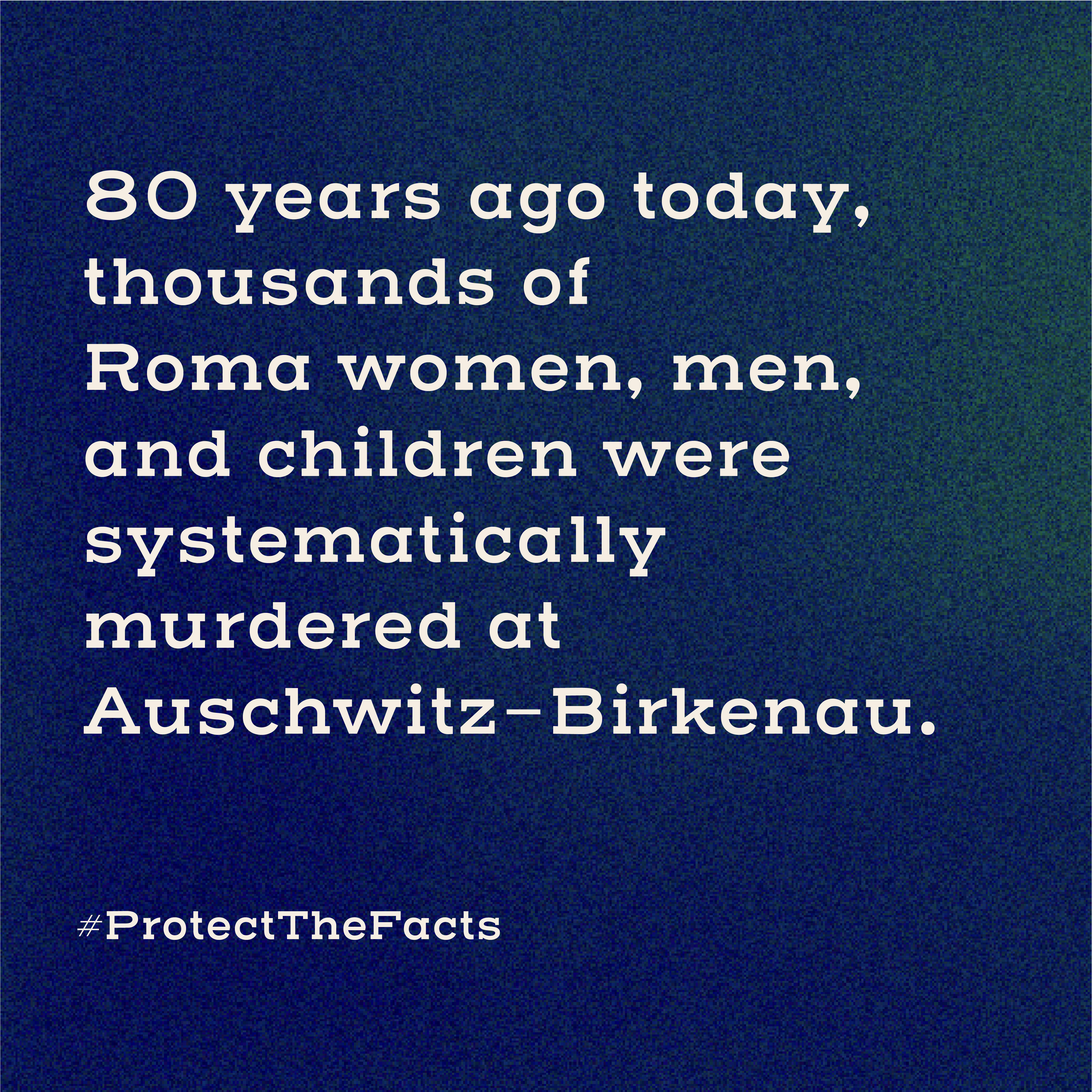During the Second World War, hundreds of thousands of Roma women, children, and men were systematically murdered by the Nazis, their allies, and collaborators. This atrocity’s legacy profoundly impacted Roma communities across Europe. In Czechia, for example, 90% of Roma were murdered. Anna Míšková, Historian at the Museum of Romani Culture in Brno and Czech delegate to the IHRA, states, “For the Czech and Moravian Roma, it meant almost extinction and the way of life that was common in the Czech Republic was almost forgotten.”

PAST AND PRESENT ANTIGYPSYISM/ANTI-ROMA DISCRIMINATION
The Nazis, their allies, and collaborators used prejudice, lies and false stereotypes to carry out widespread persecution and mass murder of Roma communities.
Despite the dedicated fight of Roma survivors and activists to gain acknowledgement of these mass killings and the fight for Roma rights, similar racist stereotypes persist today. These often include false beliefs that Roma are uneducated, steal, or abuse state assistance.
“In German-speaking countries, [Roma] are often referred to as‘travelers’, called ‘uneducated’, of course painted as petty thieves.”
– Stéphane Laederich, executive director of Rroma Foundation in Zurich and 2024 Chair ofthe IHRA Committee on the Genocide of the Roma
PRESENT ANTIGYPSYISM/ANTI-ROMA DISCRIMINATION DISTORTS THE FACTS
These prejudices continue to affect the Roma community, perpetuating discrimination and social exclusion. This can lead to a distortion of the history of the atrocities perpetrated against Roma and affect remembrance today.
“We’re still asked if inmates at Lety u Písku1, a former concentration camp for Roma, were put there because they needed to learn how to work, and not because of racial persecution.”
– Anna Míšková, Historian at the Museum of Romani Culture, Project Lead of Lety u Písku Memorial Development
In this struggle to counter distortion and denial of history, it’s key to look at the past and present for a more equal future. Support the commemoration of 2 August to reflect on what discrimination can lead to. Ensure the history and experiences of Roma are recognised, honoured and remembered.
The Council of Europe, the European Commission, the International Holocaust Remembrance Alliance, the OSCE Office for Democratic Institutions and Human Rights (ODIHR), the United Nations, and UNESCO are raising awareness about the persecution of the Roma by the Nazis, their allies, and collaborators.
JOIN THE CAMPAIGN #PROTECTTHEFACTS IN HONOURING THE ROMA VICTIMS AND SURVIVORS.
- Get active and join the effort to remember – share the campaign materials, look for commemoration events, explore the testimonies of Roma victims, and engage in conversation in your networks.
- Learn the facts of past and present discrimination against Roma. Prejudice doesn’t end unless we address it.
- Protect the facts of the persecution of the Roma against distortion and disinformation. Keep an eye out for misinformation in order to protect the historical record.
Learn more about the commemoration date of 2 August and explore helpful resources.
Learn the facts of discrimination in the Special Eurobarometer 535: Discrimination in the European Union (2023) and more about the EU’s Strategic Framework for Roma equality, inclusion, andparticipation.
Explore the campaign partners’ work on remembrance and countering discrimination today:
- The Council of Europe’s Roma and Traveller’s Division and their work on antigypsyism/discrimination.
- The HISTOLAB Tutorial Series, which includes tutorials on how to teach about the Roma Holocaust and how to teach about Roma history and culture.
- OSCE/ODIHR’s Contact Point for Roma and Sinti Issues
- The IHRA’s work on the Genocide of the Roma
- The UN Office of the High Commissioner’s Work to address antigypsyism
- Roma Genocide Resource website by ODIHR / The Council ofEurope.
1 Learn more about the Lety u Písku Memorial.
The views expressed by the individual contributors to the blog do not necessarily reflect those of the Council of Europe, the European Commission, the International Holocaust Remembrance Alliance, the OSCE Office for Democratic Institutions and Human Rights (ODIHR), the United Nations, UNESCO, or officials of Member States of the Council of Europe, the European Commission, IHRA, the OSCE Office for Democratic Institutions and Human Rights (ODIHR), the United Nations and UNESCO.